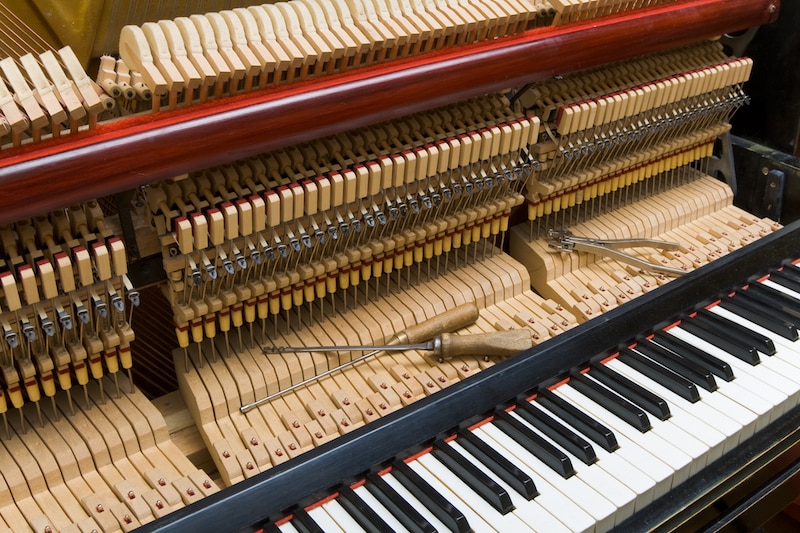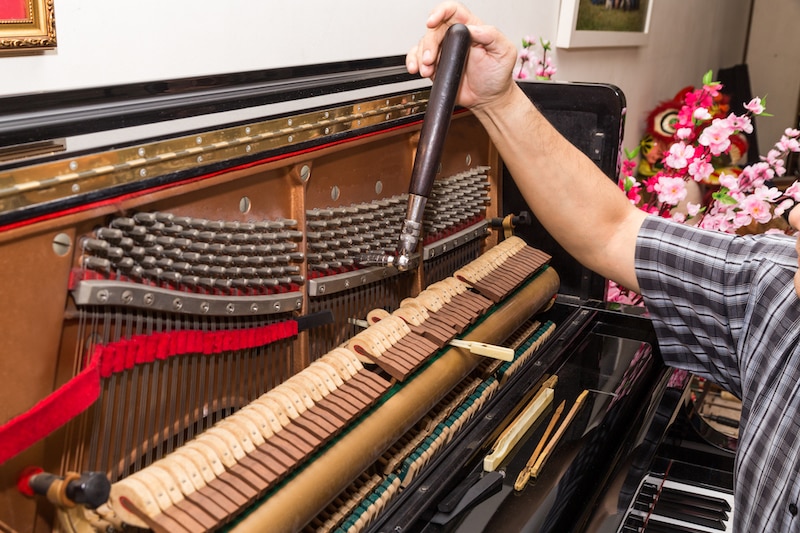Pianos, like most stringed instruments, go out of tune over time. However, unlike other instruments, it’s not easy to tune a piano on your own. You have to have special training and tools to tune pianos, and it can be quite expensive to hire someone to do it for you.
Since it’s a bit of a hassle, you might wonder how often should you tune a piano? Too often, and you might pay way too much. Too little, and your piano may start to sound pretty awful.
In this article, we’ll cover everything to do with tuning a piano. Keep reading to learn how often you should tune your piano, why pianos go out of tune, how piano tuning works, and more.
Quick Answer: How Often to Tune a Piano?
The short answer is that you should tune a piano every six months. Most upright and grand pianos need maintenance around the same time, meaning you should have your piano tuned twice per year.
Not all pianos are the same, though, and environmental factors affect how often pianos need tuning. For example, pianos in humid areas might need more tuning, while drier areas might need less.
Another thing to note is that new pianos might need tuning 3 or 4 times a year as their strings settle.
However, there are some other reasons why your piano might need to be tuned. We’ll go through all of that and more below, so keep reading to find out more about tuning pianos.
Why Do Pianos Go Out of Tune?

While you might think that your piano is going out of tune because of your playing, the truth is a bit more complicated.
If you know about the different parts of a piano you’ll know that all pianos have tightly wound strings in the soundboard, with each string having more tension than an entire guitar.
With nearly 100kg of pressure on each string, they’re bound to go out of tune, regardless of environmental factors.
However, environmental factors are a huge concern. Fluctuations in temperature and humidity cause the wood in the piano’s soundboard to contract and expand. This stretches the strings even further, causing them to go sharp or flat and need retuning.
As a result of the seasons changing, pianos tend to go out of tune much more quickly than in a perfectly controlled environment like a concert hall.
Whether you have a grand or upright piano, temperature and humidity are going to throw it out of tune, no matter how perfectly it’s maintained.
How Do You Know When You Need to Tune Your Piano?
Knowing when you should tune your piano can be a little tricky, especially if you’re new to playing it and your ear hasn’t become accustomed.
The simplest way is to keep two tuning appointments every year. If you tune your piano at six-month intervals, you shouldn’t experience any problems with keys going sharp or flat too often.
However, if you’ve recently purchased or come into possession of a piano that came from storage or a non-ideal setting, it might need more tuning the first year or two to set it straight. Consult a professional to see exactly how often your piano might need to be tuned.
Many pianists can tell by ear if a piano is out of tune. Knowing what each key is supposed to sound like takes a ton of practice, so don’t worry if you’re new to the piano and can’t immediately tell which keys are sharp or flat.
You can also check out the video above which is of someone playing a very out of tune piano!
How Piano Tuning Works

Piano tuning is fairly complicated, and people devote their whole careers to caring for pianos of all shapes and sizes. Understanding how piano tuning works is important knowledge for any pianist.
Piano tuners use a tuning fork or an app on their phone or computer to produce a reference pitch.
From there, they use a special tuning lever to carefully adjust the pegs holding the piano’s strings in place. Often by ear alone, they twist each string to the perfect position.
However, even if you understand the basics, trying to tune a piano without professional training is a disaster waiting to happen.
Whether you damage the strings, the pegs, the keys, or the soundboard, something is bound to go wrong eventually so don’t try it at home!
FAQs
Here are some of the most frequently asked questions we get about tuning a piano:
How much does it cost to tune a piano?
Unfortunately, unless you know how to tune a piano yourself and have all the right tools, you’ll have to hire someone to tune your piano. Otherwise, you risk damaging the strings and the soundboard if you attempt to do it yourself without training.
Hiring a professional piano tuner costs anywhere between $65 to $250 in most cases, meaning most people will spend between $130 and $500 per year tuning their piano. However, this cost can go up significantly if your piano needs rehabilitation.
How long does it take to tune a piano?
Most qualified piano technicians only take around an hour and a half to tune a piano. Larger pianos might take more time, but smaller pianos still take around 1.5 hours.
However, if you’re trying to tune your piano yourself and have the skills to do so as a non-professional, it might take anywhere from two to three hours. Again, we don’t recommend this, but some people do have the skills to tune their piano themself, albeit not at a professional level.
How often do piano strings need to be replaced?
While piano strings should be tuned at least twice per year, you don’t need to replace them nearly as often. Each string can last decades without being replaced. If a string does break, you can swap it out individually rather than regularly replacing every string.
A good rule of thumb is you shouldn’t replace a piano string that’s under 30 years old. If strings break, you should replace them, but there’s no need to replace any of them before then.
Also, if your piano strings break often, there’s definitely another problem causing them to break in the first place.
Where to find piano tuners near you
Finding piano tuners near you is fairly simple. A quick Google search for “piano tuners near me” will reveal most if not all piano technicians in your area.
Yelp and similar review sites are also great resources for finding high-quality piano maintenance professionals without wading through below-par services.
Conclusion
There you have it! Getting your piano tuned twice per year is the best way to keep it sounding great every time you play.
However, your piano might need a bit more tuning, so always check with a professional to see how your instrument is doing.
Whether you have an upright or grand piano, every piano needs tuning. Reach out to a piano tuning professional to ensure your piano sounds concert-ready today!

